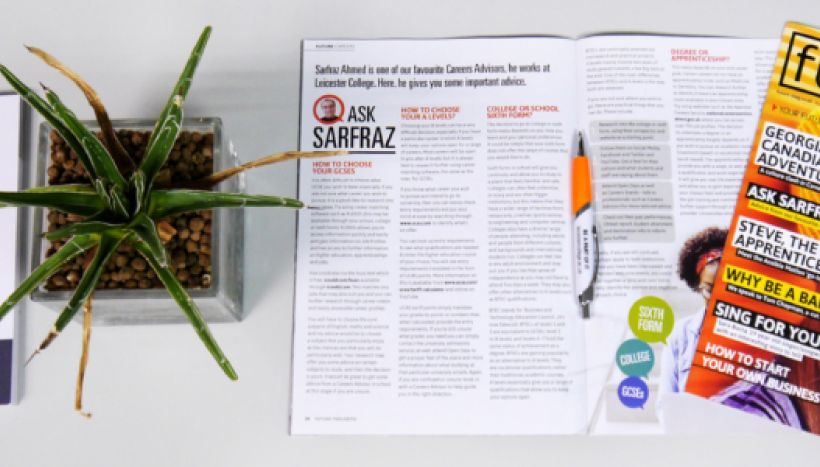Careers Advice - Choosing what's right for you
23 October 2018

We're super excited to read our careers advisor Sarfraz Ahmed's feature in the Future magazine this month. There are copies dotted around the campuses and you will spot the 'Ask Sarfraz' feature on the cover.
How to choose your GCSEs
It is often difficult to choose which GCSEs you wish to take, especially if you are not sure what career you wish to pursue. It's good to research into your ideas. Try using a career matching software such as KUDOS (this may be available through your school, college or sixth form). KUDOS allows you to access information quickly and easily on job profiles, higher education, apprenticeships and jobs. You could also try the buzz test which is free. This matches you up with jobs which are suitable for you.
You will have to choose the core subjects of English, maths and science. My advice would be to also choose a subject that you particularly enjoy as the chances are that you will do well. Your research may offer you some advice on certain subjects to study, and then the decision is yours. It would be great for you to get some advice from a careers adviser in school at this stage if you are unsure.
How to choose your A-levels
Choosing your A-levels can be a very difficult decision, especially if you have a particular career in mind. A-levels will keep your options open for a range of careers. Most careers will be open to you after A-levels, but it is always best to research further.
If you know what career you wish to pursue and intend to go to university, then you can easily check entry requirements and put your mind at ease by searching through UCAS to identify local university degrees. You can look up entry requirements to see what qualifications are required to enter the higher education course of your choice. You will see entry requirements translated in the form of UCAS points. More information on this is available from UCAS tariff calculator and online on YouTube. UCAS Tariff points simply translate your grades to points or numbers that, when calculated, provide the entry requirements. If you're still unsure what grades you need you can simply contact the university admissions service, as well as attend open days to talk to university tutors. Again, if you are confused, book an appointment with a careers adviser to help you choose your A-levels.
College or 6th Form?
The decision to go to college or sixth form really depends on you, how you learn and your personal preferences. It could be simply that the sixth form does not offer the range of courses that you would like to study. Sixth forms in school will give you continuity and allow you to study in a place that feels familiar and safe. Colleges can often be very big institutions with a range of facilities such as; restaurants; sports centres and engineering and computer centres. Colleges also have a wide range of students including adults and people from different cultures and backgrounds. Colleges can feel like a very adult environment and may suit you if you like that sense of independence. You may not have to attend five days a week. They may also offer other alternatives to A-levels such as BTEC qualifications.
BTECs are gaining popularity as an alternative to A-Levels, but they actually cover a whole range of academic levels. BTECs are vocational qualifications, rather than traditional academic courses. They are continually assessed via coursework and practical projects.
If you are not sure where you want to go, there are practical things that you can do. These are:
Research the college or sixth form, use their prospectus and website as a starting point.
Follow them on social media, Facebook and Twitter and YouTube, get a feel their culture and what students and staff are saying about them.
Attend open days in sixth form and colleges as well as careers events in school – talk to professionals such as careers advisers for more tailored advice.
Check out their past performances, student attainment and destination to inform you further.
Finally, if you are still confused, you could apply to both places. Once you have been interviewed or invited to a welcome event, you could put together a list of pros and cons to help identify the positive and negatives of each choice.
Degree or apprenticeship?
The decision to undertake a degree or an apprenticeship largely depends on if you wish to pursue an academic route (classroom-based) or vocational (work-based). The apprenticeship will provide you with a wage, as well as a qualification and work experience. The apprenticeship will also give you real-life experience in your chosen field and provide on-the-job training. You will also receive mentoring and further support through a training provider.
Universities also provide work-experience through a sandwich year. This can be beneficial as it allows you to gain work experience for a year to complement your academic studies. Some universities offer degree apprenticeships, which may be the best of both worlds. You can find more information here on apprenticeship vacancies. More information on degree apprenticeships is available online on university websites as well as on UCAS.
Make sure you attend open days, apprenticeship fairs and talk to universities and colleges to find out about each choice before making a decision.
If you are still stuck, you could make an application to university and an apprenticeship, keeping one as a backup plan. The application process may offer you a clear indication of what option would suit you better. A careers adviser in school or college may also help you to look at the pros and cons of each choice, and help you to plan ahead.
Adapted from Sarfraz Ahmed article in Future Magazine.
Follow the Careers Team on Facebook and Twitter.